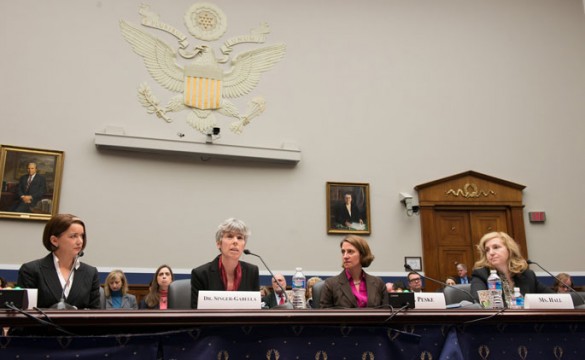
Vanderbilt professor Marcy Singer-Gabella and other education leaders traveled to the nation’s capital Feb. 27 to testify before Congress about what is needed to train and retain the nation’s top teachers. The hearing focused on federal reporting requirements and regulations, retention of effective teachers and the role of the federal government in teacher preparation.
Singer-Gabella and her colleagues testified on topics including the importance of streamlining and focusing reporting requirements for teacher preparation programs, supporting and funding research of strategic partnerships between local education agencies and institutions of higher education, and rethinking staffing and compensation structures—all in the effort to equip new and veteran teachers for sustained success.
The educators addressed two House subcommittees within the Committee on Education and the Workforce: Early Childhood, Elementary, and Secondary Education, chaired by Rep. Todd Rokita, R-IN; and Higher Education and Workforce Training, chaired by Rep. Virginia Foxx, R-NC.
Rep. Phil Roe, R-TN, a member of Subcommittee on Early Childhood, Elementary and Secondary Education, also was in attendance.
![Singer-Gabella-2[1]](https://cdn.vanderbilt.edu/vu-news/files/20190417232003/Singer-Gabella-21.jpg)
“Peabody offers intensive and extended field experiences that enable teacher candidates to learn through practice, working side-by-side with experienced mentors and other novices as they learn,” she said.
Strategic partnerships such as these are key to Peabody’s success, she said, and federal funds are needed to build on them.
“At Peabody we are fortunate to have several school partners who are working seriously with us to innovate around school organization, a large pool of academically accomplished applicants, and the flexibility that comes with relatively small size,” Singer-Gabella said. “However, … We need funds to help build and study the kinds of partnerships I’ve described, not only in places like Vanderbilt, but also in the large public universities that prepare the vast majority of teachers in this country.”
She also emphasized the need to promote teaching as a career that provides growth while still in the classroom, the collection of uniform data across states, and the challenges of using value-added estimates for program evaluation.
![Singer-Gabella-3[1]](https://cdn.vanderbilt.edu/vu-news/files/20190417232005/Singer-Gabella-31.jpg)
While subcommittee members expressed criticism of teacher preparation programs, there was bipartisan recognition that outstanding and innovative programs exist. Peabody College was hailed repeatedly as a model program.
Other witnesses included Deborah A. Gist, Rhode Island commissioner of elementary and secondary education; Heather G. Peske, associate commissioner for educator quality, Massachusetts Department of Elementary and Secondary Education; and Christina Hall, co-founder and co-director of Urban Teacher Center in Baltimore, Md.